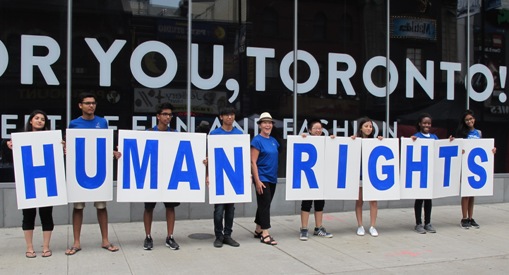
Tenants Can Now LEGALLY DEMAND Illegal “In Person” LTB Hearings To Avoid the Unfair, Unlawful, Illegitimate “On-Line Hearings!”
Protect Your Human Rights! Here Is How You Can Do It
Tenant heroes are fighting hard to physically stop evictions and have all the right intentions. The problem is this isn’t working and tenants need a new strategy.
Comrades from all over Ontario need to begin focusing on legal and political tactics to protect us from the evil forces that want to kill us all. We need to use legal loop-holes now and then focus on changing the government using the state (and the bureaucracy and the police) for our goals.
With the power of the state in our grasp we can use the state as our weapon, and not Ford’s weapon.
It may seem weird that the best advice for tenants is found on the biggest small landlords site. This is because they allow us to post without censorship.
The Ontario Landlord and Tenant Board is now having “Online Hearings”. These hearings are horrific and unfair and have made the Landlord and Tenant Board an “eviction factory”.
They also break the Ontario Human Rights Code For Landlords And Tenants.
Online Hearings Are Designed To Take Away Your Legal Rights And Evict You! This Isn’t The “Canadian Way” And It’s Illegal!
A recent story on CP24 news said that with the Landlord and Tenant Board “Online Hearings” tenants are show no mercy and act so fast to evict you they don’t even allow you to assert your human rights!
‘People are being shown no mercy,’ advocates warn in Ontario’s online-only tenancy hearings
According to the news experts stated: “It’s bad enough in normal times for people to lose their homes and to be treated unfairly an administrative proceeding. But it can be life or death in the kind of situation we’re in now,
The Online Hearings Are Not Fair and Not Right!
The experts continued: “the shift to an online-only hearing model has made it harder for tenants to present their circumstances or access legal advice, including through ACTO’s duty counsel program.”
Lawyers must now introduce themselves to tenants in the virtual session, in front of all other participants, and both need to exit the meeting to speak privately.
Tenant lawyers are entering “chaotic” hearing situations where they struggle to make themselves heard.

NDP Housing Critic Says Online Hearings Leading To Human Rights Violations And Must Stop!
Amazing NDP Housing Critic and Future Housing Minister Suze Morrison, who introduced the motion, said the online hearing format isn’t accessible for people with visual impairments or those who don’t have stable internet access, among other challenges. Evictions must stop because of this unfairness.
“I’m deeply concerned that there are human rights violations happening here,” Morrison said
But it goes beyond mercy and goes to breaking the law!!
Let’s look at just a couple of the abuses here! Canada isn’t a “banana republic” but LTB “online hearings” are!
What’s Wrong With Online Hearings? Take A Look At This Corruption! With Online Hearings You Have No Rights.
Look at this goofball destroying lives:

Tenants Can Demand “In Person” Hearings To Protect Your Human Rights (The LTB Doesn’t Want You To Know This!)
A very important change happened on November 30, 2020 that the Heroic Tenant Fighters have not been fully aware of and tenants don’t know about!
On November 30, 2020 the Ontario Landlord and Tenant Board (LTB) said requests for in-person hearings would be considered on a case-by-case basis to ensure people are accommodated under the Human Rights Code. As of mid-December, Tribunals Ontario had not confirmed if any in-person hearings had been approved.
Let’s take a look at the new rules:
November 30, 2020
Updated Practice Direction on Hearing Formats
Effective November 30, 2020, Tribunals Ontario has an updated Practice Direction on Hearing Formats. The Practice Direction outlines Tribunals Ontario’s approach to determining the format of the hearing that will be held, and how a party can request a different hearing format.The updated Practice Direction is part of Tribunals Ontario’s digital transformation to enhance the quality of dispute resolution services while meeting the diverse needs of Ontarians. The digital-first approach will continue even when the pandemic is over.
“Our approach to digital first is to create more convenient, accessible and timely access to justice but it’s not digital only. We are ensuring people who need a different hearing format are supported when they need it.” said Sean Weir, Executive Chair at Tribunals Ontario.
Matters will be scheduled for video, telephone or written proceedings unless a different format is required as an accommodation for an Ontario Human Rights Code-related need, or unless a party can establish that the specified hearing format will result in an unfair hearing.
All Tribunals Ontario’s hearing centres are closed due to the COVID-19 pandemic.
Currently, a party can contact the tribunal to make a request for an in-person proceeding. The tribunal will determine whether the matter will proceed in a different hearing format or whether it will proceed as an in-person proceeding. Tribunals Ontario will schedule limited in-person events when we are able to do so safely.
When in-person proceedings are available, Tribunals Ontario’s hearing centres will adhere to strict health and safety measures to protect staff, adjudicators and Ontarians. More details about safety protocols at hearing centres will be provided later this winter.
Tribunals Ontario is committed to providing fair, effective and timely dispute resolution services to the people of Ontario.
Read more here.

Tenants Have Human Rights In Ontario, But You Must Demand Your Rights
Ontario landlords must obey the Ontario Human Rights Code For Landlords and Tenants
Tribunals Ontario is committed to providing fair, effective and timely dispute resolution services to the people of Ontario
Housing is a human right
International law says that people in Canada should be able to get good housing that they can afford. To help achieve this in Ontario, tenants and landlords (or housing providers) have rights and responsibilities under the Human Rights Code.
Under the Code, everyone has the right to equal treatment in housing without discrimination and harassment. As a landlord, you are responsible for making sure the housing you operate is free from discrimination and harassment.
People cannot be refused an apartment, bothered by a landlord or other tenants, or otherwise treated unfairly because of their:
- race, colour or ethnic background
- religious beliefs or practices
- ancestry, including people of Aboriginal descent
- place of origin
- citizenship, including refugee status
- sex (including pregnancy and gender identity)
- family status
- marital status, including people with a same-sex partner
- disability
- sexual orientation
- age, including people who are 16 or 17 years old and no longer living with their parents
- receipt of public assistance.
People are also protected if they face discrimination because of being a friend or relative of someone identified above.
Where do housing rights apply?
The right to equal treatment without discrimination applies when renting or buying a unit (for example, in a high rise apartment, condo, co-op or house). This right also applies to choosing or evicting tenants, occupancy rules and regulations, repairs, the use of related services and facilities, and the general enjoyment of the premises.
As a landlord or housing provider, you are one of the people responsible for making sure tenants’ human rights are respected. Government legislators, policy makers, planners and program designers, tribunals and courts must also make sure their activities, strategies and decisions address discrimination issues in housing.
Choosing tenants
The Code says what business practices are acceptable and what information you may ask for when choosing tenants:
- Rental history, credit references and/or credit checks may be requested. A lack of rental or credit history should not be viewed negatively.
- You can ask for income information, but you must also ask for and consider it together with any available information on rental history, credit references and credit checks (such as through Equifax Canada).
- You can only consider income information on its own when no other information is made available.
- You can only use income information to confirm the person has enough income to cover the rent. Unless you are providing subsidized housing, it is illegal to apply a rent-to-income ratio such as a 30% cut-off rule.
You can ask for a “guarantor” to sign the lease – but only if you have the same requirements for all tenants, not just for people identified by Code grounds, such as recent immigrants or people receiving social assistance.
Accommodating tenant needs
You have a legal duty to accommodate tenants (meet special needs they may have) if they have real needs, based on Code grounds. You must accommodate up to the point of undue hardship, based on cost, the availability of outside sources of funding, or health and safety concerns.
For example, for a tenant with a disability, you might need to make changes to a unit, a building entrance, sidewalks or parking areas.
Some tenants need changes to rules and practices to accommodate changing family situations or religious practices. Sometimes a tenant who is unwell or who disrupts others (either because of a disability or due to that person being the target of discrimination themselves) may need help. You should assess your role to see if there are things you can do as a landlord to help the situation.
You and your tenants share the responsibility for making the accommodation work. You must take an active role in the process and work with tenants in good faith to find the best solution. If your tenant provides you with medical or other personal information, you must keep it private.
Landlords must work with tenants to find and put in place the most appropriate accommodation as soon as possible. If this cannot be done without causing undue hardship, or if it will take a long time, you must provide interim or “next-best” accommodation.
Special programs and circumstances for housing
Under the Code, special programs are permitted to help a group of people who are disadvantaged based on Code grounds, as long as these programs meet the requirements the Code sets out. Examples would include setting up housing designed for older people, people with disabilities or university students with families.
When the Code does not apply
The Code does not apply in the case of a disagreement or “personality conflict” with a landlord or another tenant unrelated to a Code ground, or if a tenant shares a bathroom or kitchen with the owner or the owner’s family.
You can advance human rights in housing
Housing providers can take a number of steps to prevent discrimination and harassment and address human rights in rental housing by developing:
- anti-discrimination and anti-harassment policies
- plans for reviewing and removing barriers
- procedures for responding to accommodation requests
- procedures for resolving disputes quickly and effectively
- education and training programs.
It is important to make sure that organizational rules, policies, procedures, decision-making processes and culture do not create barriers, and do not cause discrimination. Areas where barriers could exist include wait-list and eligibility criteria, and occupancy rules including guest policies and bedroom requirements,
Follow some key human rights principles:
- design inclusively – which means thinking about people’s possible accommodation needs before you design your building, set up your rules, etc., so that your housing does not cause new barriers
- identify and remove existing barriers
- maximize integration – which means setting up housing and programs that are inclusive, where everybody can take part
- look at the needs of individuals. and consider the best possible solution

How You Can Use The New Rules Made On Nov. 30, 2020 And Win!
Remember the Landlord and Tenant Board has clearly stated the following:
“Matters will be scheduled for video, telephone or written proceedings unless a different format is required as an accommodation for an Ontario Human Rights Code-related need, or unless a party can establish that the specified hearing format will result in an unfair hearing.”
This is the loop hole to protect you and your family!

Who Can Demand An “In Person Hearing” Based On Human Rights Rules For Landlords?
Let’s take a look at the rules again:
Accommodating tenant needs
Landlords have a legal duty to accommodate tenants (meet special needs they may have) if they have real needs, based on Code grounds. You must accommodate up to the point of undue hardship, based on cost, the availability of outside sources of funding, or health and safety concerns.
For example, for a tenant with a disability, you might need to make changes to a unit, a building entrance, sidewalks or parking areas.
Some tenants need changes to rules and practices to accommodate changing family situations or religious practices. Sometimes a tenant who is unwell or who disrupts others (either because of a disability or due to that person being the target of discrimination themselves) may need help. You should assess your role to see if there are things you can do as a landlord to help the situation.
You and your tenants share the responsibility for making the accommodation work. You must take an active role in the process and work with tenants in good faith to find the best solution. If your tenant provides you with medical or other personal information, you must keep it private.
Landlords must work with tenants to find and put in place the most appropriate accommodation as soon as possible. If this cannot be done without causing undue hardship, or if it will take a long time, you must provide interim or “next-best” accommodation.
Special programs and circumstances for housing
Under the Code, special programs are permitted to help a group of people who are disadvantaged based on Code grounds, as long as these programs meet the requirements the Code sets out. Examples would include setting up housing designed for older people, people with disabilities or university students with families.

Tenants Facing Eviction Need To Go On Offence And Demand “In Person” Landlord And Tenant Board Hearings Based On Your Human Rights!

-Landlords have a legal duty to accommodate tenants (meet special needs they may have) if they have real needs, based on Code grounds. You must accommodate up to the point of undue hardship, based on cost, the availability of outside sources of funding, or health and safety concerns.
-For example, for a tenant with a disability, you might need to make changes to a unit, a building entrance, sidewalks or parking areas.
-Some tenants need changes to rules and practices to accommodate changing family situations or religious practices.
-Sometimes a tenant who is unwell or who disrupts others (either because of a disability or due to that person being the target of discrimination themselves) may need help. You should assess your role to see if there are things you can do as a landlord to help the situation.
-You and your tenants share the responsibility for making the accommodation work. You must take an active role in the process and work with tenants in good faith to find the best solution. If your tenant provides you with medical or other personal information, you must keep it private.
-Landlords must work with tenants to find and put in place the most appropriate accommodation as soon as possible. If this cannot be done without causing undue hardship, or if it will take a long time, you must provide interim or “next-best” accommodation.
-Special programs and circumstances for housing
Under the Code, special programs are permitted to help a group of people who are disadvantaged based on Code grounds, as long as these programs meet the requirements the Code sets out. Examples would include setting up housing designed for older people, people with disabilities or university students with families.

Tenants Facing Eviction Can Go Offence And Demand “In Person” Landlord And Tenant Board Hearings.
While Online Hearings are unjust, In-Person Hearings are fair and you will have legal rights.
Online Hearings are a trap that will get you evicted and destroyed!
Also, In Person Hearings will be delayed for months so you don’t need to worry about being evicted like cattle being slaughtered to make hamburger.
Find part of the Ontario Human Rights Codes That Fits Your Situation and Demand A Formal, Real “In-Person” Hearing and Win!
File a Tenant Rights T2 Form against your landlord and explain you couldn’t pay rent (or didn’t pay rent) because your landlord broke the Ontario Human Rights Code!
The Human Rights Code won’t be legal if you share a bathroom/kitchen with your landlord or you are just having a “disagreement” with your landlord. So make sure to explain your situation is not just a “disagreement” but the landlord is breaking your Human Rights! This will mean you have the legal right to an “in person” hearing!
Remember, according the Human Rights Codes Landlords MUST ACCOMDATE TENANT NEEDS.
For Example:
1. Landlords have a legal duty to accommodate tenants (meet special needs they may have) if they have real needs, based on Code grounds. You must accommodate up to the point of undue hardship, based on cost, the availability of outside sources of funding, or health and safety concerns.
For example, if you are feeling sick or have an injury you might need to make changes to a unit, a building entrance, sidewalks or parking areas.
IF THE LANDLORD DIDN’T MAKE THESE CHANGES THEY ARE BREAKING THE ONTARIO HUMAN RIGHTS CODE.
2. Some tenants need changes to rules and practices to accommodate changing family situations or religious practices. Sometimes a tenant who is unwell may need help.
SO IF YOU WERE SICK OR LOST YOUR JOB AND UNWELL YOUR LANDLORD NEEDS TO MAKE SURE THEY HELP YOU OR THEY ARE BREAKING THE HUMAN RIGHTS CODE.
3. Landlords and your tenants share the responsibility for making the accommodation work. Landlords must take an active role in the process and work with tenants in good faith to find the best solution.
YOUR LANDLORD MUST BE RESPONSIBLE FOR TRYING TO MAKE YOUR ACCOMMODATION WORK. THEY CAN’T JUST LEGALLY KICK YOU OUT WITHOUT DOING SO.
4. If your tenant provides you with medical or other personal information, you must keep it private.
YOUR LANDLORD MUST KEEP ALL YOUR PERSONAL INFORMATION PRIVATE. THEY CAN’T MAKE BILLBOARDS OR ‘BAD TENANT LISTS’ OR THEY WILL BE FINED
5. Landlords must work with tenants to find and put in place the most appropriate accommodation as soon as possible. If this cannot be done without causing undue hardship, or if it will take a long time, you must provide interim or “next-best” accommodation.
IF YOU HAVE A PROBLEM WITH YOUR RENTAL (FOR EXAMPLE IT’S TOO EXPENSIVE DURING THE PANDEMIC) YOUR LANDLORD MUST HAVE TRIED TO OVER YOU INTERIM ACCOMMOCATION.
There Is An Eviction Blitz And The Landlords Are Paper Tigers Who Are Getting Easy Evictions ONLY Because of Corrupt On-Line Hearings! Only A Corrupt Fascist Gov’t With Massive Foreign Funding Is Causing People To Be Evicted And Suffering!
Fight Back And Get Your In Person Hearing And Avoid Being Evicted Due To Banana-Republic Style Corruption And Political Manipulation

When ideology clashed with opportunism, Lenin invariably chose the tactical path above doctrinal purity https://www.historyextra.com/period/20th-century/vladimir-lenin-who-power-rise-how-russian-revolution/
Tenant Groups We Know The On-Line LTB Hearings Are Corrupt. Ford Won’t Fix Them! We Must Help Every Tenant Get An In-Person Hearing NOW! When We Control The State We Can Defund The Sheriff Instead Of Fighting On Their Fascist Terms! Do It!





















